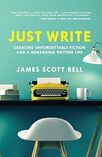| One of many writing guides by thriller writer James Scott Bell, Just Write is divided into two sections: “Writing Unforgettable Fiction” focused on writing craft, and “A Rewarding Writing Life,” which gives excellent advice on life as a published author. Both sections are written in a clear, accessible style. There is some crossover in the writing craft section with his other how-to books, such as Plot & Structure. |
On writing craft:
To help strengthen your own work, ask questions when reading other writers, such as: “How does the writer make me want to turn the page? How am I drawn to the lead character? How does the writer integrate minor characters?”
His three rules for novels that sell: “1. Don’t bore the reader. 2. Put characters in crisis. 3. Write with heart.” He says: “Create a compelling character and put [her] in a “death match” with an opponent…and only write scenes that in some way reflect or impact that battle.”
For inner conflict: “identify the fear a character feels in each scene.”
"To help you get to the meaning [of your story], imagine your main character twenty years after the events of the plot have occurred. Ask this character why she had to go through all that trouble. What life lesson did she learn that she can pass along to the rest of us?"
To help strengthen your own work, ask questions when reading other writers, such as: “How does the writer make me want to turn the page? How am I drawn to the lead character? How does the writer integrate minor characters?”
His three rules for novels that sell: “1. Don’t bore the reader. 2. Put characters in crisis. 3. Write with heart.” He says: “Create a compelling character and put [her] in a “death match” with an opponent…and only write scenes that in some way reflect or impact that battle.”
For inner conflict: “identify the fear a character feels in each scene.”
"To help you get to the meaning [of your story], imagine your main character twenty years after the events of the plot have occurred. Ask this character why she had to go through all that trouble. What life lesson did she learn that she can pass along to the rest of us?"
Favorite writing craft quotes:
- The best [novels] consist of simple plots about complex characters.
- The secret to originality can be found in the limitless interior landscape of human beings.
- Place exposition seamlessly into confrontational dialogue. [Instead of telling the reader Frank never wanted children, show them through dialogue: “You never wanted a baby, Frank.”]
- What a reader really and truly wants is to be entranced.
- Your goal needs to be not just to meet reader expectations but to surpass them.
- Cast your characters so they have the potential of conflict with every other character.
- Don’t warm up your engines. Get the reader turning the page not because he’s patient with you, but because he needs to find out what is going to happen next.
A Rewarding Writing Life quotes:
- What talent you have is not up to you. What is up to you is what you do with it.
- …find the stories you are burning to tell. …keep the magic alive in your writing. …Readers can sense that you’re excited. That makes your writing more appealing.
- You do your work the best you can and you let the results happen, because you can’t manipulate them. …You can only give it your best shot each time out.
- Give each scene you write your most creative and wild investment you can muster.
- Believe in your limitless choices. Nurture the love of writing that got you started in the first place.
- Here’s the key to everything: You must put your original voice, vision, style, spice, characters, love, and passion into a story that, structurally, helps the reader feel what you want them to feel.
- Don’t stress about style. Get excited about the tale. That’s the key to the elusive concept of “voice.”
- Dedicate thirty minutes each day to nurturing relationships with other writers.
- Put your head down and work. Do not check your phone or your email. Do not go to Twitter [X] or Facebook. Do not pass Go. Do not collect $200.
- Throughout the day ask, “What’s the best use of my time right now?” [Beware of] spending too much time doing something that doesn’t offer enough return.
- …you must want [writing] enough. Enough to take all the rejections, enough to pay the price of disappointment and discouragement while you are learning. Like any other artist, you must learn your craft
More advice from James Scott Bell: Plot & Structure


 RSS Feed
RSS Feed